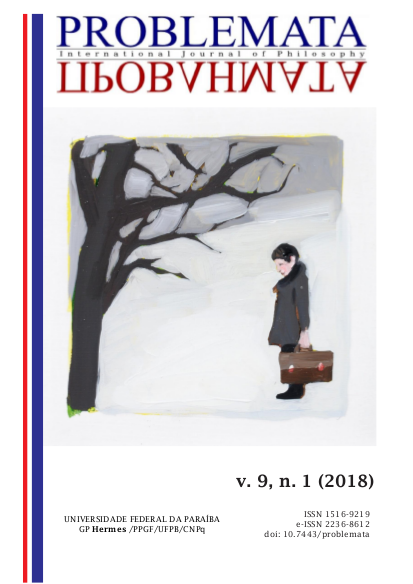“IN THE BEGINNING WAS THE SIGN” – A GENESIS OF ERNST CASSIRER'S PHILOSOPHY OF SYMBOLIC FORMS AS A COUNTERPOINT TO THE NEO-KANTIANISM OF THE MARBURG SCHOOL.
DOI:
https://doi.org/10.7443/problemata.v9i1.38715Keywords:
Cassirer, Cohen, Natorp, Neokantism.Abstract
The article develops a panorama of the work of the philosopher Ernst Cassirer, demonstrating its initial influence and its later counterpoint in relation to the Neokantian Marburg School.Downloads
References
BAYAER, T. Cassirer's Metaphysics of Symbolic Forms, ed. Yale University Press, Londres, 2001.
CASSIRER, E. Kant, vida y doctrina, trad.Wenceslau Roces Ed. Fondo de Cultura Económica, México 1993.
______. Symbol, Myth, and Culture. Essays and lectures (1935-45), org. Donald P. Verene, New Haven, Yale University Press.
______. Antropologia Filosófica. Um ensaio sobre o homem, trad. Vicente Felix de Queiroz, ed. Mestre Jou, São Paulo, 1977
______. Davoser Vorträge. Em Nachgelassene Manuskript und Texte. Vol. 17, Ed. Felix Meiner Verlag, Hamburgo, 2014.
______. Kant und das Problem der Metaphysik. Bermerkungen zu Martin Heideggers Kant Interpretation, Kant-Studien, 36, 1931.
______. El Problema del Conocimiento en la Filosofia y en la Ciencia Modernas. Vol.I el renascer del problema del conocimiento el descubrimiento del concepto de naturaleza los fundamentos del idealismo. Trad. Wenceslao Roces Ed. Fondo de Cultura Económica, México1986(a)
______. El Problema del Conocimiento en la Filosofia y en la Ciencia Modernas. Vol.II desarrollo y culminación Del racionalismo el problema Del conocimiento em el sistema Del empirismo de Newton a Kant –la filosofia crítica. Trad. Wenceslao Roces, ed. Fondo de Cultura Económica, México1986(b).
______. El Problema del Conocimiento en la Filosofia y en la Ciencia Modernas. Vol.III Los sitemas postkantianos. Trad. Wenceslao Roces, ed. Fondo de Cultura Económica, México1986(c).
______. El Problema del Conocimiento en la Filosofia y en la Ciencia Modernas. Vol.IV De La muerte de Hegel a nuestros dias [1832-1932] trad. Wenceslao Roces, ed. Fondo de Cultura Económica, Mexico1986(d).
______. Esencia y efecto del concepto de símbolo. Trad.Carlos Gerhard, ed. Fondo de Cultura Económica, México, 1989.
______. Substance and Function, [and] Einstein's Theory of Relativity, trad. William Curtis Swabey e Marie Collins Swabey, ed. The Open Court Publishing Company, Chicago, 1923.
______. A Filosofia das formas simbólicas. Vol. I – A linguagem. Tradução: Marion Fleischer. Editora Martins Fontes, São Paulo, 2001.
______. A Filosofia das formas simbólicas. Vol. II – O Pensamento Mítico. Tradução: Flávia Cavalcanti, Ed. Martins Fontes, São Paulo, 2004
______. A Filosofia das formas simbólicas. Vol. III - Fenomenologia do conhecimento, trad. Eurides Avance de Souza, ed. Martins Fontes, São Paulo, 2011.
______. The Philosophy of Symbolic Forms. Vol.IV The methaphysics os Symbolic Forms , trad. John Michael Krois, ed. Yale University Press, Pennsylvania, 1996.
______. O Mito do Estado, trad. Álvaro Cabral, Ed. Códex, São Paulo 2003.
______. Las ciencias de la cultura, trad. Wenceslau Roces, ed. Fondo de Cultura Económica, México,1965.
______. Linguagem e mito, trad. J. Guinsburg e Mirian Schnaiderman, Ed. Perspectiva S.A., São Paulo, 2006.
______. Gesammelte Werk. Hamburger Ausgabe Vol. 18, ed. Félix Meiner Verlag, 2004.
CASSIRER, E. COHEN, H. NATORP, P. L’École de Marbourg, Œuvres XLVIII, préface de M. Ferrari, trad. de C. Berner, F. Capeillères, M. de Launay, C. Prompsy, I. Th omas-Fogiel, Paris, Cerf, 1998.).
COHEN, H. Commentaire de La “Crítique de La Raison Pure” trad. Éric Dufour, ed. Du Cerf, Paris 2007.
______. Kants theorie der Erfahrung, 3ed., Bruno Cassirer, Berlin 1918
______. La Théorie Kantianne de l’expérience, trad. Éric Dufour e Julien Servois, ed. Du Cerf, Paris 2001.
GORDON, P. E. Continental Divide – Heidegger, Cassirer, Davos, ed. Harvard University Press, Londres, 2010
GORDON, P. Myth and Modernity: Cassirer´s Critique of Heidegger. Ed. New German Critique, pp. 127-168, n. 94, 2005.
HAMBURG, C. H. Symbol and Reality: Studies in the philosophy of Ernst Cassirer, Ed. Martinus Nijhoff, 1956.
KROIS, M. Symbolic Forms and Cultural Studies Ed. Yale University Press, Londres, 2004
______. Cassirer: Symbolic Forms and History Ed. Yale University Press Londres, 1987.
LAUNAY, M. (org.) Cohen, Natorp, Cassirer, Rickert, Windelband, Lask, Cohn: Neokantismes Et Theorie de La Connaissance, ed. VRIM, Paris, 2000.
LOFTS, S.G. A “Repetition” of modernity, ed. State University of New York, Albany, 2000.
NATORP, P. Kant und die Marburger Schule. Kant-Studien, 17 ,1912, p.193
NUNES, B. A filosofia contemporânea, ed. Buriti, São Paulo, 1967.
PORTA, M. A filosofia a partir de seus problemas. Ed. Loyola, São Paulo, 2002.
______. Estudos Neokantianos, Ed. Loyola, São Paulo, 2011.
PHILONENKO, A. L’École de Marbourg, Ed. J. VRIN, Paris, 1989.
______. in CHATELLET, F. História da filosofia, idéias e doutrinas. Trad. Bernhardt, J. Rio de Janeiro: Zahar, 1974. Vol. 6: A filosofia do mundo científico e industrial.
RUDOLPH, E. E. Cassirer im Kontext. Kulturphilosophie zwischen Metaphysik und Historicismus, Ed. Mohr Siebeck, 2003.
SCHILPP, P.A. (org.) The Philosophy of Cassirer ed. Open Court Pub, Illinois 1973.
VERENE, D. F. Kant, Hegel and Cassirer: The origins of the Philosophy of Simbolic Forms pp. 36-41, em Journal of the History of Ideas, 30:1 (jan-mar 1969)
Downloads
Published
Issue
Section
License
Authors who publish with this journal agree to the following terms:
- Authors retain copyright and grant the journal right of first publication with the work simultaneously licensed under a Creative Commons Attribution License that allows others to share the work with an acknowledgement of the work's authorship and initial publication in this journal.
- Authors are able to enter into separate, additional contractual arrangements for the non-exclusive distribution of the journal's published version of the work (e.g., post it to an institutional repository or publish it in a book), with an acknowledgement of its initial publication in this journal.
-
- Authors are permitted and encouraged to post their work online (e.g., in institutional repositories or on their website) prior to and during the submission process, as it can lead to productive exchanges, as well as earlier and greater citation of published work (See The Effect of Open Access).





